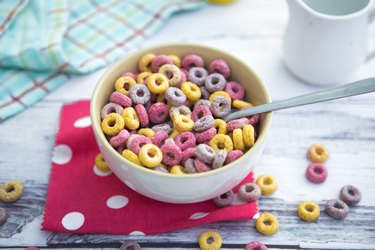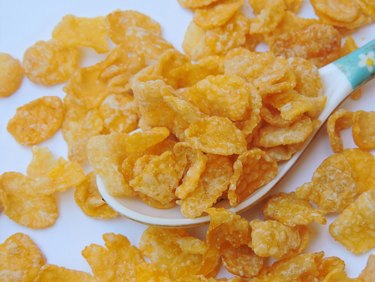
Here's something that might make you spit out your coffee: Breakfast isn't the most important meal of the day. Despite what you may have learned from a silly rabbit, zany bird or hunky tiger, breakfast doesn't necessarily have a leg up on any other meal.
Still, the philosophy that breakfast trumps lunch and dinner is pervasive — and that's all thanks to some incredibly clever marketing that began in the late 1800s. Let's take a look back to see how we got here, and dig into the truth about the day's first nosh.
Video of the Day
Video of the Day
The Beginning of Breakfast as We Know It
Breakfast — at least, in the modern sense — was not much of a concept until Americans were introduced to cereal. Prior to the late 19th century, people primarily ate leftovers in the morning, according to Abigail Carroll's 2013 book, Three Squares: The Invention of the American Meal.
Wealthier folks would eat now-traditional breakfast foods like eggs and pancakes, but they'd also enjoy chicken, steak and oysters — so the meal didn't look much different from those consumed in the afternoon or evening.
Breakfast in those days tended to be heavy on meat and fat, and people were experiencing all types of digestive issues. That's why Dr. John Harvey Kellogg (does that last name ring a bell?) invented corn flakes in the 1890s, according to the Smithsonian; he believed they would be easy to digest and help soothe stomach ailments.
But early editions of cereal were very different from what you'll find on supermarket shelves today: Instead of fruity, chocolatey, frosted and sugary, cereal was bland and billed as a health food.
With support from the doctor's claims around this new food category, it didn't take long for cereal, and other "gentle" foods, to take off: Just a decade after the flakes' debut, there were more than 100 cereal factories in Kellogg's hometown of Battle Creek, Michigan, according to Felicity Lawrence's 2008 book, Eat Your Heart Out: Why the Food Business Is Bad for the Planet and Your Health.
Kellogg aggressively worked his superpowers as a trusted physician and a crafty marketer.
"[I]n many ways, the breakfast is the most important meal of the day, because it is the meal that gets the day started," reads a 1917 article in Good Health, the self-identified "oldest health magazine in the world."
The magazine was edited by — you guessed it — Kellogg himself. The article stressed how important it was for breakfast food to be easily digestible and low in calories, and of course, cereal fit the bill.

The fire was lit, and it only continued to burn. C.W. Post (the founder of what's now called Post Cereals), who happened to be a patient of Kellogg's, invented Grape Nuts. Post spread the gospel around cereal's health benefits, according to Lawrence, claiming it could cure everything from malaria to appendicitis.
In the earlier half of the 1900s, cereal companies began to fortify their products with vitamins, which added more substance to their health claims. It wasn't until 1944, however, that breakfast was solidified as the day's "most important meal."
The claim can be traced back to a marketing campaign for Grape Nuts called "Eat a Good Breakfast-Do a Better Job," which included promotional pamphlets that were distributed throughout grocery stores, along with ads on the radio, in which speakers announced, "Nutrition experts say breakfast is the most important meal of the day."
More than 70 years have passed since breakfast's ultimate campaign — and yet, the ideals have continued to stick.
Why Breakfast Is Still Important
Many nutrition experts encourage starting the day with a balanced bite. "I always recommend breakfast to my clients, whether they are trying to lose weight or maintain their weight," says Amy Gorin, RDN, owner of Amy Gorin Nutrition, based in the New York City area.
While the day's first meal may not deserve its long-standing "most important" superlative — all meals are important, stresses Gorin — it certainly does have its merits.
The key? Making sure breakfast is providing you with quality nutrition.
"The quality of what you're eating is just as important as when you're eating it," Gorin says. "Setting yourself up with a healthy breakfast helps you not only get into a healthy eating mindset for the day but it also provides you with nutrients — such as protein, fiber and healthy fats — that will help keep you fueled for your most productive morning."
Plus, current research underscores the health benefits of breakfast.
Eating breakfast may have a positive effect on body mass index (BMI): People who made breakfast their most substantial meal of the day were more likely to have a lower BMI compared to those who ate more calories for lunch or dinner, according to a 2017 study in Nutrition that analyzed the health of 50,000 people over a seven-year period.
Eating breakfast could also ward off certain health conditions.
Men who ate more calories in the morning (mostly from either monounsaturated or saturated fats) were at a lower risk for stroke, a February 2019 study in Nutrients found.
Research also suggests that breakfast could play a role in mental health: A 2017 study published in Appetite linked going without breakfast to an increased risk for depression.
Related Reading
Should You Skip Breakfast to Lose Weight?
Fueling your body on a fairly regular schedule has benefits, so pulling your a.m. calories from the mix could have negative effects — like prompting overeating later on.
"When you eat every three to five hours on a consistent basis — this would typically include three meals and one to two snacks — you provide your body with consistent fuel and energy, and it keeps you from overeating at random times when you get hungry," Gorin says.
"The meal you eat now may prevent the binge you have later," adds Dominic Matteo, a Level 2 Master Class Coach with Precision Nutrition Coaching. "Some breakfast-skippers simply aren't hungry [in the morning], don't eat and they're fine. Others end up eating 3,000 calories of junk food later."
While there's evidence that eating breakfast helps certain people maintain healthy waistlines, some weight-loss plans, especially those that focus on intermittent fasting, advise skipping the traditional breakfast.
Indeed, followers of the popular 16:8 diet often forgo a morning meal entirely. The 16:8 advises people to only eat during an eight-hour window, and many choose to do so during the hours of 12 p.m. and 8 p.m.
There is some promising research associated with this type of diet: It may help reduce overall calorie consumption and could even help jumpstart weight loss for those who've hit a plateau.
In fact, a February 2018 study published in the International Journal of Obesity found that alternating periods of calorie restriction — which can be achieved via fasting — with periods of calorie balance allowed subjects to achieve greater weight and fat loss.
Despite a handful of positive findings, there's plenty more research needed to validate this eating routine.
"While this type of diet can work for some people, I'd suggest talking with a health care provider before starting it," Gorin says. "Intermittent fasting can be dangerous for some people. For instance, if you're pregnant, breastfeeding or have diabetes or hypoglycemia, this is not the diet for you. Also, if you have a history of disordered eating, I'd advise against this eating style, as it has a very restrictive nature and may lead to overeating or binge eating."
Related Reading
So, What Should You Eat for Breakfast?
Eating breakfast certainly can be good for you, especially if it consists of the right ingredients (which aren't usually found in mainstream cereal, BTW).
"With any meal, I recommend including a lean protein, such as an egg or Greek yogurt, fruit or veggies, healthy fat (think: avocado or nut butter) and whole grains," Gorin says. "This combo of nutrients helps to keep you satiated for the few hours until lunchtime."
Hungry for some inspiration? We've got you covered with six high-protein, plant-based breakfasts worth waking up for.
Related Reading
- Google Books: "Three Squares: The Invention of the American Meal"
- Smithsonian.com: "The Secret Ingredient in Kellogg’s Corn Flakes Is Seventh-Day Adventism"
- Google Book: "Eat Your Heart Out: Why the Food Business is Bad for the Planet and Your Health"
- Journal of Nutrition: "Meal Frequency and Timing Are Associated with Changes in Body Mass Index in Adventist Health Study 2"
- Nutrients: "Breakfast Choice Is Associated with Nutrient, Food Group and Discretionary Intakes in Australian Adults at Both Breakfast and the Rest of the Day."
- Appetite: "Breakfast consumption and depressive mood: A focus on socioeconomic status"
- International Journal of Obesity: "Intermittent energy restriction improves weight loss efficiency in obese men: the MATADOR study"
- American Marketing Association: "Merchandising the Advertising Campaign"